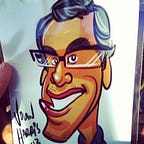Why didn’t John F. Kennedy de-escalate the Cuban Missile Crisis?
He could have publicly withdrawn missiles from Turkey
Question: Why did JFK refuse Nikita Khrushchev’s de-escalation deal? Khrushchev suggested they publicly withdraw their missiles from Turkey and Cuba.
Answer: Because JFK was a coward. Given the choice between true courage and bravado, he chose the latter.
Welcome to Costs Matter, a series that asks different questions all of which have the same answer: to better manage costs. The costs are usually economic though not always. The series focuses narrowly on the impact of costs. It does not claim these costs are the sole cause. To read more in the series, visit https://medium.com/galileo-onwards/costs/home.
A brief timeline of the Cuban Missile Crisis
- 1961, the US places nuclear missiles in Turkey, threatening the USSR
- 1962, the USSR installs nuclear missiles in Cuba, threatening the USA [1]
- Oct 22, 1962, Kennedy orders a naval “quarantine” on missiles entering Cuba. (Kennedy chose quarantine over the technical term “blockade” which has military implications. If a declared blockade is violated, then war follows; this stringency doesn’t apply to a “quarantine”.)
- USSR’s leader, Nikita Khrushchev, suggests to Kennedy that both the Soviets and Americans publicly withdraw their respective missiles from Cuba and Turkey. This way they can both be seen as deescalating tensions.
- Kennedy refuses.
- Secretly the administrations make a deal to withdraw the missiles from both countries.
- Khrushchev agrees to publicly withdraw his missiles from Cuba, the US publicly agrees to nothing. In other words, Khrushchev agrees to look like a coward.
The Cuban Missile Crisis can simply be summed up as the leaders of two nuclear armed countries engaged in a game of chicken. Chicken is a “game” where two individuals drive their cars towards at each other for a head-on collision, at full speed, and the first one to veer out of the way is chicken. Except in this crisis, the cars didn’t contain just the drivers but several million humans. Morally, it’s one thing for someone to endanger his own life (by bungee jumping, say); but it’s entirely another to endanger the lives of those you’re responsible for. In the Cuban Missile Crisis, autocratically chosen, totalitarian Khrushchev opted to save humankind while democratically elected, freedom loving Kennedy gambled.
The book I cite from is Jonathan Glover’s Humanity (2001).
As early as he could, Khrushchev wrote against escalation: “If people do not display wisdom, they will reach the point where they will clash… and then mutual annihilation will commence”.
For Kennedy though, the problem was reelection. He said to his brother that “he had no choice but to respond toughly” because he had “won the election partly by playing on fears of a Soviet missile lead”. He was afraid that agreeing to a compromise with USSR would make him appear weak to his voting population. In fact, he would not even publicly defend his UN Ambassador from media criticism for recommending a public missile withdrawal. Adlai Stevenson, the Ambassador in question, received “a lot of private support” from Kennedy but when he asked for public support was only told “to sit tight”.
Had Kennedy accepted Khrushchev’s original proposal that both countries publicly withdraw, tensions would have immediately calmed down. By not doing this, he unnecessarily prolonged the crisis and made things much, much worse. Because of his actions, all defense systems were on a higher alert than their normal hair-trigger alert. All told, the forty odd Soviet missiles in Cuba weren’t really the problem that concerned Kennedy and his staff. They had more than 700 in Turkey. Kennedy’s Defense Secretary, Robert McNamara said, “I don’t believe it’s primarily a military problem. It’s primarily a domestic political problem.”
Eventually, we survived the crisis due to two main reasons: (a) Khrushchev’s bravery and (b) dumb luck.
William R. Polk, who was a Kennedy appointee to the State Department and a member of the Cuban Missile Crisis management team, says that had Khrushchev “been clever and not wise we probably would have had a nuclear war”. The below excerpt is taken from YouTube [2].
We were so very close during the Cuban Missile Crisis and, in fact, if Mr. Khrushchev had been clever and not wise we probably would have had a nuclear war. What he did was he accepted the humiliation of backing down…. He risked a coup d’état by his own military and if he’d been overthrown that way he would’ve been shot immediately. So in effect, he was having to choose between taking a chance on being shot or being irradiated and almost certainly being shot and he chose the brave thing of saying that he would back down.
You could say, Polk credits Khrushchev’s courageous concessions over Kennedy’s cowardice for our continued existence.
In my own life, I have only seen one political leader openly declare never to use nuclear weapons as a first option — Britain’s then Labour leader Jeremy Corbyn — and he was criticized for it (though it never took much for the media to go after Corbyn). See this YouTube video [3]. And just as it needed a boy to point out the emperor had no clothes, in the video below everyone piles on Corbyn until a woman asks why people so intent on killing millions with nukes (go to time 7:15).
Reportedly, Obama wanted to declare a no first use policy but was talked out of it because it would be interpreted as “as a sign of American weakness” [4].
Trump made things worse by nearly letting Obama’s New START treaty expire without renewal. Fortunately, Biden won and extended it until 2026.
Footnotes
[1]: Fidel Castro in his book My Life claims he did ask for the Soviet missiles and expresses disappointment at Khrushchev’s eventual withdrawal.
[2]: https://www.youtube.com/watch?v=CneC9d7VMy0&t=1163s
[3}: https://youtu.be/cU-ITKrCr0I, for the sane woman’s comments, see https://youtu.be/cU-ITKrCr0I?t=430
